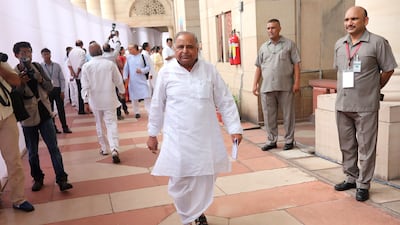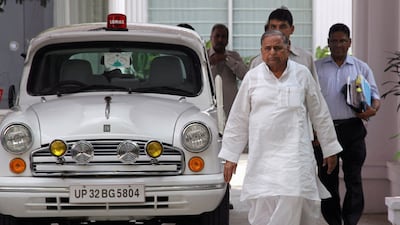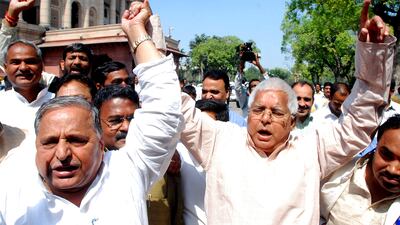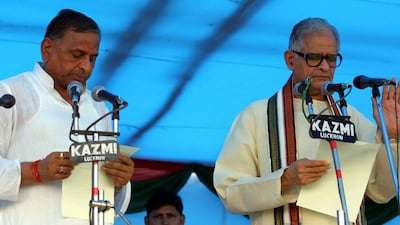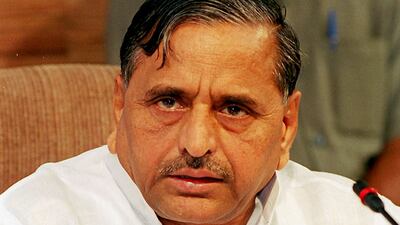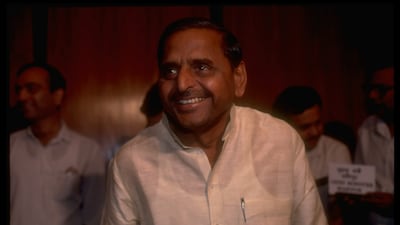Mulayam Singh Yadav, India's former defence minister and a three-time chief minister of the country's most populous state, Uttar Pradesh, died on Monday at the age of 82 after a prolonged illness.
Mr Yadav had been in a critical condition for days and on life support at a private hospital in Gurugram outside the capital, New Delhi.
He was counted among India’s most respected and influential politicians who shaped the country’s politics over the past three decades.
Mulayam Singh Yadav, India's former defence minister and a three-time chief minister of the country's most populous state, Uttar Pradesh, died on Monday at the age of 82 after a prolonged illness.
Mr Yadav had been in a critical condition for days and on life support at a private hospital in Gurugram outside the capital, New Delhi.
He was counted among India’s most respected and influential politicians who shaped the country’s politics over the past three decades.
Born on November 22, 1939, he started as a student politician before plunging into mainstream politics under the mentorship of veteran socialist leaders such as Ram Manohar Lohia and Raj Narain.
He was first elected as a legislator in 1967. In 1975, he was arrested and kept in custody for 19 months when India was under emergency.
He first became a minister in Uttar Pradesh in 1977 and the chief minister of the state in 1989 — decimating the national Indian National Congress party that could never return to power in the state.
Mr Yadav is remembered for clamping down on a Hindu extremist mob in 1990 that came to Ayodhaya to demolish the medieval Babri Masjid and construct a Ram Temple.
But his government fell a year later after Congress pulled out from the coalition government. His party lost the midterm elections in 1991 to the Hindu nationalist Bharatiya Janata Party, with many linking the electoral defeat to his actions to protect the mosque from Hindu zealots.
The mosque was razed in December 1992.
Former wrestler
A former wrestler turned teacher, Mr Yadav, who hailed from a “backward class” — a term used to describe historically disadvantaged castes — founded the Samajwadi Party, or Socialist Party, after splitting from Janata Dal, the national ruling party at the time, in 1992, with a focus on uplifting the backward castes in the state.
He started several schemes for the empowerment of people belonging to lower and backward castes, including coaching schemes for candidates wanting to take highly competitive examinations.
He was elected 10 times in a regional assembly and seven times as a parliamentarian, as well as three times to govern the state with a population larger than Brazil.
Mr Yadav was once even considered as a candidate for the post of Indian prime minister, and served as the country’s defence minister from 1996 to 1998.
Indian Prime Minister Narendra Modi expressed his grief and called him a “remarkable personality”.
“Mulayam Singh Yadav's death pains me; he was a remarkable personality and was widely admired as a humble and grounded leader,” Mr Modi wrote on Twitter.
Uttar Pradesh chief minister Yogi Adityanath announced a three-day mourning period in the state.
After successful years in politics, Mr Yadav faced rebellion from his son Akhilesh Yadav, also a former chief minister of the state, after he took the reins of the party in 2012 — a decision that led to a nearly decade-long feud in the Yadav family.
The party split into two, with one faction supporting Mr Yadav's brother and the other backing the foreign-educated son.
Mr Yadav initially threw his weight behind his brother and briefly expelled his son from the party over “indiscipline” but gradually supported his son, who had won a landslide election in 2012 and became the youngest chief minister of the state.
Mr Yadav was respected for his political acumen across the political spectrum but he equally courted controversies.
He was criticised by his political rivals for his association with several politicians with criminal backgrounds, as well as his comment in 2014, that “boys make mistakes” when referring to increasing rapes in the country.
His remains were flown from New Delhi to Lucknow, the state capital, where they will be kept at the party office. His last rites will be performed at his ancestral village in Safai, with full state honours on Tuesday.
